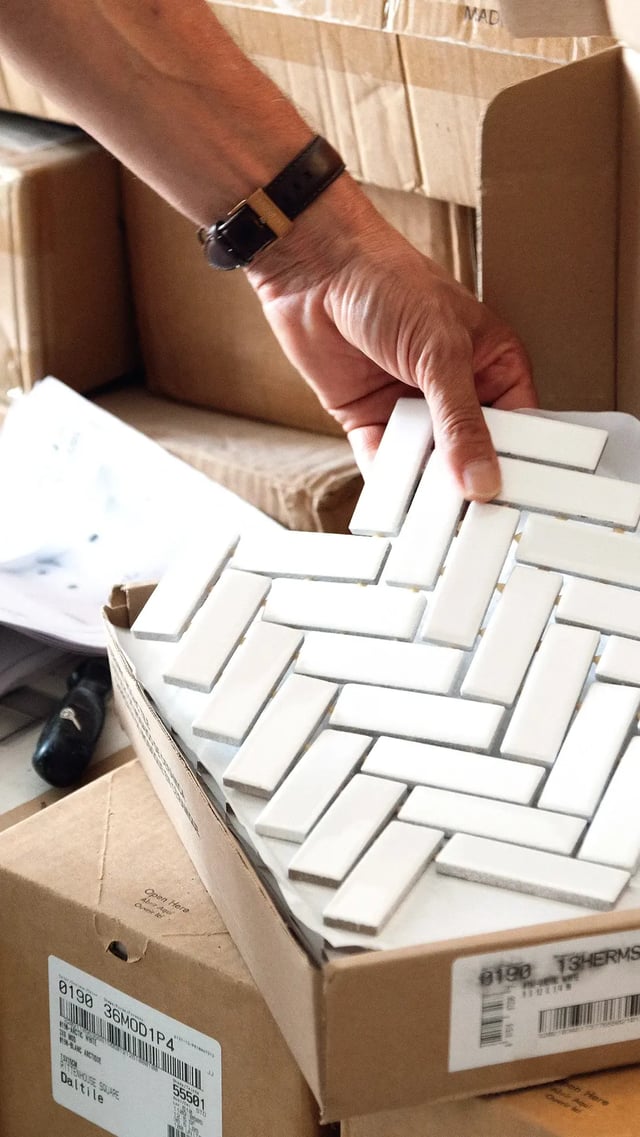
Contractors
50 Most Common Home Renovation Questions (Answered by Experts)
10.28.2025
Our New Year savings event is here: Get up to $6,500 off your project today (terms apply).


In This Article
Planning a renovation can feel like juggling a hundred decisions at once. From budgeting and permits to design choices and contractor quotes, the process can quickly get overwhelming.
This guide brings together the 50 most common renovation questions homeowners ask, along with expert answers that help you plan, budget, and build with confidence. Whether you’re remodeling a kitchen, refreshing a bathroom, or reimagining your entire home, these FAQs will help you understand what to expect, where to start, and how Block Renovation can make the process simpler, more personalized, and more protected from start to finish.
1) How much does a home renovation cost?
Home renovation costs can vary dramatically based on the scope of work, the mix of rooms involved, and the level of finishes you choose. Full whole‑home remodels often range anywhere from around $15–$200 or more per square foot, depending on whether you’re doing basic upgrades or high‑end luxury renovations. It helps to break down your budget by room: kitchens and bathrooms typically cost the most per square foot (given cabinetry, tile, and fixtures), while bedrooms or living rooms cost less. Use Block Renovation’s cost guides to anchor expectations—start with per‑room cost guides and per‑square‑foot ranges to sanity‑check contractor bids. Remember to include a 10–20% contingency for unexpected expenses.
Use Renovation Studio for personalized cost estimates based on your layout and finish choices, then compare vetted contractor bids side‑by‑side for fairness.
2) Where do I start when planning a renovation?
Start by clearly defining your goals and scope, then establish a realistic budget (including a 10–20% cushion). Map out phases—whether you’ll renovate all at once or in stages—and gather comparable quotes with identical scopes. Confirm permit needs early.
A free Project Planner from Block helps interpret proposals and timelines so you start with a solid plan.
3) Is it cheaper to renovate or rebuild?
Completely rebuilding is rarely the most cost‑effective path in urban areas. Most homeowners compare renovating (surface updates) vs. remodeling (deeper layout/system changes). Costs rise with scope complexity, structural changes, and permitting. Renovating typically costs less than a full remodel or teardown/rebuild for similar goals.
4) How do I budget for a renovation?
Break costs into labor, materials/finishes, permits/fees, and a contingency (10–20%). Include often‑overlooked items like delivery, disposal, and design services. Sequence spending by phase and tie payments to milestones. Block’s Price Assurance and expert scope reviews minimize change orders and help keep budgets on track.
5) What renovations add the most value to a home?
Kitchens and bathrooms typically deliver strong ROI. Curb‑appeal upgrades and energy‑efficiency improvements (windows, insulation, HVAC) can also lift value and reduce operating costs.
6) How long does a typical renovation take?
Whole‑home timelines vary with scope. Kitchens often require about 6–12 weeks of construction once design and permits are complete; bathrooms can range from a few weeks for refreshes to 6–8+ weeks for full gut remodels.
7) What should I renovate first—kitchen, bathroom, or flooring?
Address structural and systems issues first. Prioritize kitchens and bathrooms for daily usability and value. Install continuous flooring last to avoid damage from other work.
8) How can I live at home during a renovation?
Create “no‑construction” sanctuary zones, plan dust control, and set up temporary kitchen or bath solutions. For major scopes, consider short‑term relocation during the most disruptive phases.
9) How do I avoid going over budget?
Lock selections early, insist on itemized scopes, keep a 10–20% contingency, and manage changes through written change orders only. Track spending against milestones. Block Renovation’s expert scope reviews, Price Assurance, and real‑time pricing in Renovation Studio reduce surprises.
10) What questions should I ask a contractor before hiring them?
Verify licensing and insurance, confirm experience with similar projects, check references, clarify supervision, timeline, change‑order process, and warranty. Block’s network is pre‑vetted for licenses, insurance, references, and background checks.
11) How do I find a reliable contractor?
Shortlist licensed, insured pros with relevant portfolios; obtain at least three comparable, itemized bids and check references. Block matches you with vetted local contractors and provides a Project Planner to compare quotes.
12) Should I hire an architect or a designer?
Architects handle structural/permit drawings; designers focus on space planning, materials, and finishes. Many projects benefit from both.
13) Do I need permits for my renovation?
Yes for most electrical, plumbing, structural, and mechanical work. Cosmetic swaps often don’t require permits, but always check local rules.
14) How do I check if a contractor is licensed and insured?
Request license numbers and insurance certificates and verify them with your state authority. Block’s network is pre‑vetted for licenses, insurance, references, and background checks.
15) What’s the difference between a general contractor and a subcontractor?
General contractors manage the project, permits, and schedule; subcontractors execute specialized trades (plumbing, electrical, tile) under the GC’s coordination. Some opt for design‑build firms for a single‑contract approach.
16) How do I compare renovation quotes?
Block allows you to compare quotes by providing apples‑to‑apples scopes with line‑item pricing for materials, allowances, labor, and permits. Normalize allowances and evaluate timelines and warranties—not just price. Block provides side‑by‑side proposal comparison, expert scope reviews, and protected remodels.
17) What should be included in a renovation contract?
A detailed scope of work, drawings/specs, itemized allowances, milestones/timeline, payment schedule, change‑order process, warranty, insurance, and permits.
18) How do I handle unexpected costs or delays?
Activate contingency funds, avoid mid‑stream scope changes, require written change orders, and tie payments to milestones. Communicate early to reset timelines. Block offers progress‑based payments and consultant support if issues arise.
19) How do I know if my renovation quote is fair?
Cross‑check with Block’s cost guides and per‑square‑foot ranges; compare at least three itemized bids. Use Renovation Studio for personalized estimates to your space, scope, and materials.
20) What should I do if my contractor is behind schedule?
Review contract milestones, document slippage, request a written recovery plan, and adjust via change orders where appropriate. Keep payments tied to progress. Block offers progress‑based payments (to keep your contractor on schedule), dashboard visibility, and escalation support when needed.
21) How much does a kitchen remodel cost?
Ranges depend on size, materials, and layout changes—from modest refreshes to high‑end custom builds. Budget 5%–15% of home value for full renovations and include contingency. See real‑time pricing as you adjust finishes in Renovation Studio.
22) What’s the best layout for a small kitchen?
Galley, single‑wall plus island/peninsula, or L‑shape layouts typically optimize the work triangle and storage in compact spaces. Use ceiling‑height cabinets and smart organizers.
23) Should I choose quartz or granite countertops?
Quartz is non‑porous, low‑maintenance, and uniform; granite is natural, unique, heat‑resistant, but needs periodic sealing. Choose based on maintenance tolerance and style.
24) Are custom cabinets worth it?
Custom shines for precise fits and specialty storage; semi‑custom often offers the best value for standard layouts. Quality boxes and hardware matter most for longevity.
References: [Modernizing kitchen (cabinets & more)](https://www.blockrenovation.com/guides/modernizing-your-kitchen-cabinet-updates-more)
25) How long does a kitchen renovation take?
Typical construction runs about 6–12 weeks after planning and permits, with timeline drivers like cabinet lead times and inspection schedules.
26) What are the most durable kitchen materials?
Porcelain/ceramic for floors; quartz or stone for counters; and sturdy cabinet boxes with quality hardware. Favor easy‑to‑clean finishes.
27) How can I make my kitchen more energy‑efficient?
Consider induction cooking, LED lighting, efficient ventilation, sealed building envelope upgrades, and Energy Star appliances.
28) What’s trending in kitchen design right now?
Minimalist lines, mixed textures and metals, smart storage, and sustainable finishes—often in light neutrals with warm accents.
29) How do I maximize storage in a small kitchen?
Use ceiling‑height cabinets, pull‑outs, toe‑kick drawers, vertical dividers, wall‑mounted rails, and zone planning.
30) What’s the difference between a remodel and a refresh?*
A refresh swaps finishes (paint, pulls, lighting); a remodel changes layout/systems and often requires permits.
31) How much does it cost to remodel a bathroom?
Costs are driven by size, tile coverage, fixture quality, and whether plumbing/electrical relocations are needed. Bathrooms typically cost more per square foot due to concentrated
32) What are the most popular bathroom tile options?
Porcelain/ceramic for durability and easy maintenance; natural stone for character; and creative mixes (e.g., hex mosaics with large‑format walls) for modern looks.
33) Should I install a shower or a bathtub?
Showers save space and suit daily use; tubs appeal to soakers and can aid resale in family markets. Keep at least one tub in the home if possible.
34) How do I waterproof a bathroom properly?
Use approved membranes on floors and wet walls, slope to drain, seal penetrations, and use cementitious backers under tile. Ventilate to keep humidity in check.
35) What’s the best layout for a small bathroom?
Maintain clearances, use pocket/sliding doors, consider wall‑mounted fixtures, and prefer a walk‑in shower in tight footprints to maximize open floor area.
36) How long does a bathroom remodel take?
Simple refreshes can be just a few weeks; full gut jobs typically run 6–8+ weeks depending on tile scope, inspections, and custom glass lead times.
37) How do I improve ventilation in a bathroom?
Install a properly sized, quiet exhaust fan ducted outside (use a timer/humidistat), leverage operable windows, and use moisture‑tolerant finishes.
38) What are the best lighting ideas for bathrooms?
Layer ambient + task (vanity) + accent lighting; favor high‑CRI bulbs and comfortable color temperatures. Consider sconces at eye level for even face lighting.
39) How do I make my bathroom more accessible?
Use a curbless shower, wider clearances, blocking for grab bars, comfort‑height fixtures, and slip‑resistant tile. Consider wall‑hung fixtures for easier mobility. )
40) What bathroom upgrades are worth the splurge?
Curbless showers, heated floors, durable tile, and quality ventilation/lighting deliver daily comfort and long‑term appeal.
41) How do people usually pay for renovations?
Common methods include cash/savings, HELOC or home‑equity loans, personal/home improvement loans, or a cash‑out refinance—each with different rates and terms. Block provides financing options for homeowners. Speak to your Project Planner for more information.
42) Are home improvement loans a good idea?
They can be—unsecured loans are fast and don’t use your home as collateral, but often have higher rates than equity‑backed options. Compare total cost and terms.
43) Can I use my home equity for renovations?
Yes—HELOCs and home‑equity loans are common for mid‑ to large‑scale projects, typically offering lower rates than unsecured loans.
44) How do I estimate renovation costs per square foot?
Use per‑square‑foot bands as a sanity check, then refine by room type, finish level, and location—per‑square foot is less accurate for very small rooms like baths.
45) What hidden costs should I plan for?
Permits, unforeseen conditions (e.g., outdated wiring, water damage), HOA/board requirements, temporary housing, and post‑construction cleaning.
46) How do I choose a color palette for my home?
Start with lighting and fixed finishes; build a cohesive neutral base and layer accents. Test large swatches at home and consider flow room‑to‑room.
47) What’s the difference between modern and contemporary design?
“Modern” references specific 20th‑century movements; “contemporary” reflects what’s current and evolves over time—today’s contemporary borrows from modern but isn’t era‑bound.
48) What flooring is best for kitchens and bathrooms?
Porcelain/ceramic tile is the go‑to for water resistance and durability; LVP is a softer, budget‑friendly waterproof option; engineered or hardwood can work in kitchens (not full baths).
49) How do I make my renovation more sustainable?
Choose durable materials, low‑VOC paints, efficient fixtures/appliances, improve insulation/daylighting, and donate or recycle demolition materials to reduce waste.
50) What are common renovation mistakes to avoid?
Under‑scoping, late selections, vague contracts, skipping permits, unrealistic timelines, and choosing contractors solely on lowest price. Plan thoroughly and communicate.
Block Renovation helps you design, budget, and build with confidence. Explore your project in Renovation Studio for real-time pricing, or connect with a Project Planner to get expert guidance from day one.

Written by Block Renovation

Renovate confidently with Block
Easily compare quotes from top quality contractors, and get peace of mind with warranty & price protections.
Thousands of homeowners have renovated with Block

4.5 Stars (100+)

4.7 Stars (100+)

4.5 Stars (75+)

Contractors
50 Most Common Home Renovation Questions (Answered by Experts)
10.28.2025
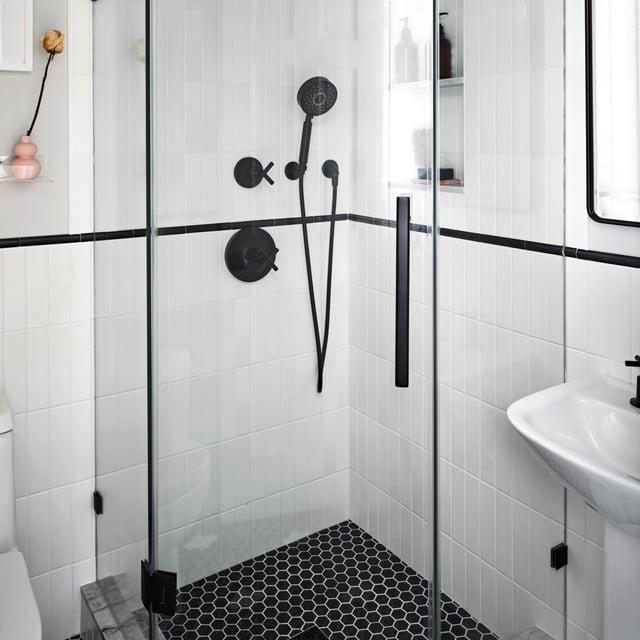
Contractors
Half Bathroom to Full Conversion: Costs, Permits & Designs
08.02.2025
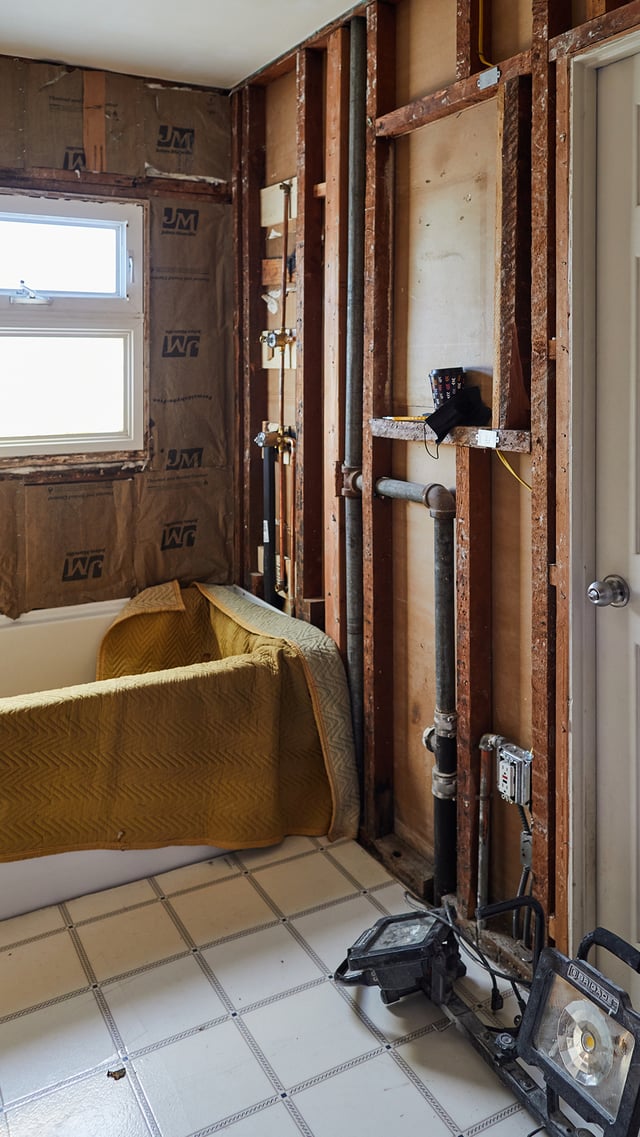
Process
Gutting a Bathroom: What It Entails, Costs & Timeline
07.15.2025
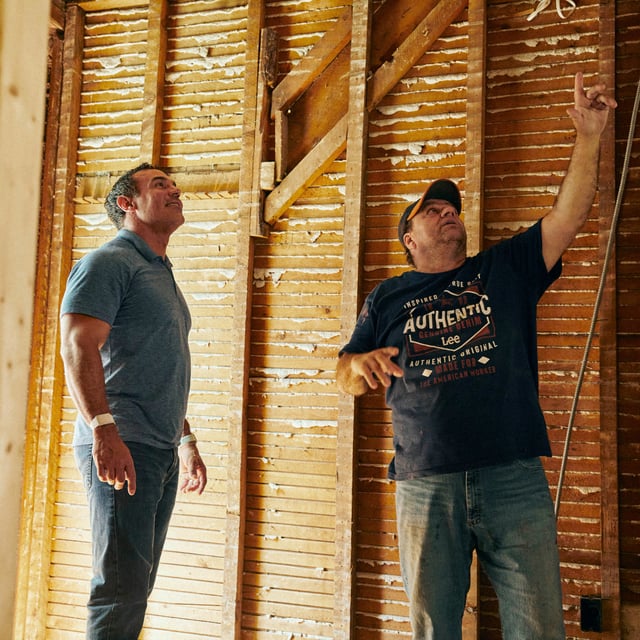
Timelines
What's the Best Time of the Year to Renovate?
05.15.2025
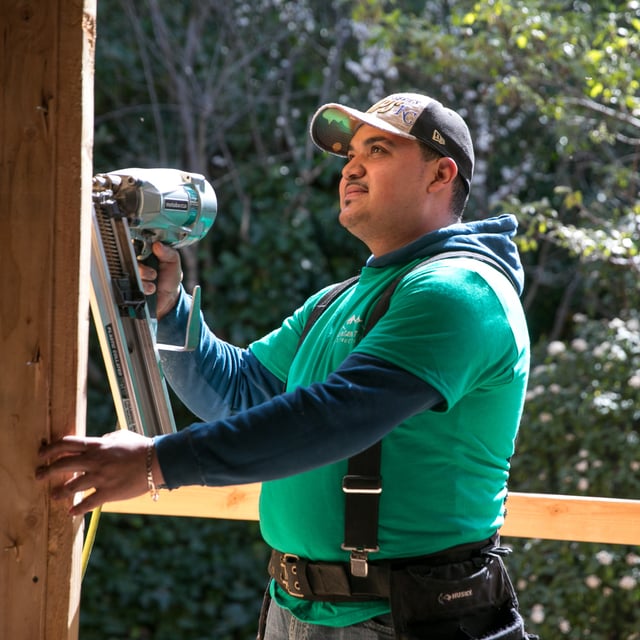
Contractors
How to Find a Home Addition Contractor
04.25.2025
Renovate confidently